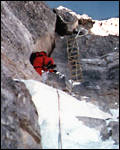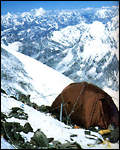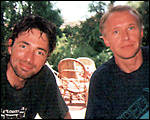
| CHECK OUT Everest '99 Everest Archives Ed Viesturs Endeavor 8000 '96 Untold Story More Climbing |
MountainZone.com.
All Rights Reserved.

In The Death Zone
Excerpted from The Other Side of Everest,
Chapter Nine
 The Second Step [click to zoom] | |
The perspective from the Col was also far more impressive than from Five. Because we had traversed quite a distance across the Face, we were now looking down at the western side of the wall, with the avalanche-swept Southwestern Face of Changtse behind.
| "A figure crouched down at the entrance to the tent, red-eyed and desperate. It was the Hungarian climber..." |
Somewhere at the bottom of that Face was the Catalan camp. We had heard little of the Catalans beyond the news that one of their team members had returned to Kathmandu with a suspected heart condition. From our vantage point we could see that the hanging glaciers of the western side were far more threatening than those on the east. Furthermore, their route was sitting in the full force of the prevailing westerly wind, whereas our route on the eastern side was to some extent protected.
I didn't envy the Catalans their task. Their chances of getting anywhere on the mountain were hampered by the western route to the Col, and they had virtually no Sherpa support. By contrast we were in a very privileged position, with significant amounts of oxygen and food waiting for us here at Camp Six.
 Camp Six, 8,300m [click to zoom] | |
Gyaltsen came over from the Sherpa tent to speak to Al.
At Base Camp I had noticed he was always on the move, with a spring in his step. Here he was walking in slow motion, and obviously very tired.
"What time do you want to leave tonight?"
Al pulled his oxygen mask aside to reply.
"Wake up midnight. Leave by two."
"Fine."
Gyaltsen showed us where the cooking gas cylinders had been cached in the snow and then plodded back up the snowfield to join Mingma and Lhakpa in their cramped dome tent.
Al and I sat, too tired to talk, watching the clouds gather over the Rongbuk. To our right, on one of the rock areas, the ten or so dome tents of other expeditions were gathered. As I looked over, there was no sign of life.
A nagging voice in my head was telling me we should get some shots of Camp Six before the cloud came up and obscured the view. When I asked him, Al dragged himself to his feet to do this without a complaint-which, if he was feeling as utterly drained as I was, showed an impressive level of commitment.
While Al was shooting, it was all I could manage to unstrap my crampons, pull off the snow gaiters, and crawl into the tent. As soon as I was lying down, both legs suddenly locked again into the spasms of cramp that I had now come to expect at the end of virtually each climbing session. The culprit was my hamstring-the largest muscle in the human body, which runs down the back of the leg from the buttocks to the ankle. Both hamstrings locked rigid until I managed to push back my toes and ease the pain.
|
"My friend is dying. I want you to try and help me rescue him..." |
The tent interior was stuffed with coils of rope and the prepacked food bags we had selected back at Base Camp. Ripping my own pack open, I could only wonder at the choice of foods I had made all those weeks before. The tin of tuna salad I had so confidently packed was now enough to make my stomach churn. Just looking at the picture of the fish on the label was enough to elicit a wave of nausea. Fish and altitude do not mix very well.
We ripped open Brian's, Al's, and Barney's food parcels and found better fare. Best of all were the packets of muesli, which I added to a mug of hot chocolate and ate warm. Then we heated up a couple of freeze-dried meals and forced them down, taking breaths from the oxygen masks between mouthfuls.
Sunset must have been an incredible sight, but all I saw of it was a glimmer of red light reflected in the metal of an oxygen cylinder outside the tent. I was determined to conserve every single scrap of energy, and getting out of the tent to take a still photograph was not a priority no matter how splendid it was.
Our main discussion was about the oxygen. With three members of our own team now definitely out of the equation, there was the possibility that we could take an extra cylinder each for the summit push. The pro argument was that we would be able to set the cylinders on a higher flow with the obvious advantages that would bring. The con was the weight, an extra six kilograms (thirteen pounds)-a very serious consideration given the physical demands of what lay ahead. We talked over the issues and decided to leave in a few hours' time. (In fact when it came to it, Al decided he would take an extra cylinder and I decided against doing so.)
By 8:00 P.M., we were into the third round of melting snow, when footsteps approached from outside. A figure crouched down at the entrance to the tent, red-eyed and desperate. It was the Hungarian climber who, with Reinhard Wlasich, the Austrian, had been attempting the North Face without oxygen.
 Matt (l) and Alan (r) [click to zoom] | |
"I need some... have you a way to help... some oxygen and some gas... please." His speech was slurred and barely understandable. He sounded like he was suffering from the onset of high-altitude sickness.
"Take it easy and calm down a bit. Now what's the problem?" Al made some space for him to kneel in the front of the tent.
"My friend is dying. I want you to try and help me rescue him. We're in that tent over there." He pointed out into the night.
"You're talking about Reinhard?"
"Yes. Reinhard. He's dying. If we don't get him down the
mountain he'll be dead. You have to help me."
"What about the Norwegian doctor-Morton. Has he seen him?"
"He did. This afternoon."
"And what did he say?"
"He has edema-on the lungs and cerebral."
"Is he conscious?"
"He's in a coma."
"Well, if he's in a coma he is going to die. There's no way
anyone can get him off the mountain. Have you got oxygen?"
"It's finished. Can I take a bottle?"
"You can take as much as you need. Have you got a regulator?"
"Yes. But if we go now we can rescue him."
"How?" Al was icy calm.
"I don't know. We can carry him. I have to do something!" The Hungarian was distraught, and beginning to vent his frustration as anger at us.
"There's nothing we can do. No matter how many people we had up here, we still couldn't get him down to Five. Think about the rocks, how are you going to lower him down?"
The Hungarian went quiet. In his heart he knew that Al was right. Even if Reinhard had been conscious, a rescue would have been impossible. The fact that he was in a coma was as good as a death sentence here at 8,300 meters (27,230 feet).
"How much longer do you think he will live?"
"I don't know. He's hardly breathing."
Al and I exchanged a glance. The same thought occurred to both of us at the same time: the Hungarian, determined to stay with his fellow climber right to the bitter end, was even now putting his own life in danger.
| "Well, if he's in a coma he is going to die. There's no way anyone can get him off..." |
"You'll be dead by tomorrow night if you stay here. So take two oxygen bottles now, get through the night, and come back at first light to take another bottle to get you back down to Five. OK?"
The Hungarian nodded slowly.
"You're doing as much as you can by staying with him. But he can't be rescued. If you stay here now you'll be putting other lives in danger. Are you still fit enough to get down tomorrow on your own?" "Yes." His reply was barely audible.
He picked up the two oxygen bottles and walked off into the night, the very picture of a broken man. I wondered what kind of hell he was returning to: within a few hours Reinhard would be dead by his side.
"You know the strangest thing?" A chilling memory had come back
to me.
"What?"
"When you and Barney decided to turn Brian back on the Ridge you
saw Reinhard and his mate carrying on and said he might die."
"That's true. I could see by the speed they were moving that
they were heading for trouble."
Then another memory hit me-a recollection of a discussion I had
with Al before leaving for Kathmandu.
"And do you remember the conversation we had when you came round for the meal?" Al had visited us in Hertfordshire a few weeks before the expedition left. "You predicted this would happen. You said we'd get to Camp Six and find someone in exactly that state. In fact I think you specified it would be an Eastern European."
"Yeah, I do remember."
"Don't you think that's bizarre?"
Al thought for a moment. "Not really. There's so many disorganized teams on Everest these days you're more likely than not to find someone in trouble here."
And with that we resumed the cooking and the subject was closed for discussion. But in my mind the extraordinary conversation we had just had with the Hungarian was churning away. Why didn't I feel more compassion for him? Why hadn't we at least offered to go and check on Reinhard just in case he had miraculously recovered?
The truth was that the mountain had dehumanized me and hardened my emotional response. The news about Reinhard's impending death had neither surprised me nor shocked me. Instead it seemed normal. This is Camp Six-8,300 meters (27,230 feet), my mind was telling me, this is where people do die if something goes wrong. Reinhard was beyond help. We all were. To be prepared to go this high, we had all willingly made an unwritten pact with the mountain that says: "I'm putting myself in a position where I know I can die." Given that level of personal commitment, perhaps it is not surprising that luxuries like pity and compassion are often left behind at Base Camp along with other unnecessary baggage. If we had brought those emotions with us, perhaps we would be needing them now-for ourselves.
I was beginning to understand what the Death Zone really means.
— Matt Dickinson, Author